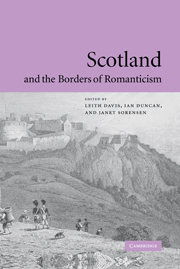Book contents
- Frontmatter
- Contents
- List of contributors
- Acknowledgments
- Introduction
- 1 Coleridge, Hume, and the chains of the Romantic imagination
- 2 The pathos of abstraction: Adam Smith, Ossian, and Samuel Johnson
- 3 Antiquarianism, the Scottish Science of Man, and the emergence of modern disciplinarity
- 4 Melancholy, memory, and the “narrative situation” of history in post-Enlightenment Scotland
- 5 Scott, the Scottish Enlightenment, and Romantic Orientalism
- 6 Walter Scott's Romantic postmodernity
- 7 Putting down the Rising
- 8 Joanna Baillie stages the nation
- 9 William Wordsworth and William Cobbett: Scotch travel and British reform
- 10 Burns's topographies
- 11 At “sang about”: Scottish song and the challenge to British culture
- 12 Romantic spinstrelsy: Anne Bannerman and the sexual politics of the ballad
- 13 “The fause nourice sang”: childhood, child murder, and the formalism of the Scottish ballad revival
- Index
2 - The pathos of abstraction: Adam Smith, Ossian, and Samuel Johnson
Published online by Cambridge University Press: 22 September 2009
- Frontmatter
- Contents
- List of contributors
- Acknowledgments
- Introduction
- 1 Coleridge, Hume, and the chains of the Romantic imagination
- 2 The pathos of abstraction: Adam Smith, Ossian, and Samuel Johnson
- 3 Antiquarianism, the Scottish Science of Man, and the emergence of modern disciplinarity
- 4 Melancholy, memory, and the “narrative situation” of history in post-Enlightenment Scotland
- 5 Scott, the Scottish Enlightenment, and Romantic Orientalism
- 6 Walter Scott's Romantic postmodernity
- 7 Putting down the Rising
- 8 Joanna Baillie stages the nation
- 9 William Wordsworth and William Cobbett: Scotch travel and British reform
- 10 Burns's topographies
- 11 At “sang about”: Scottish song and the challenge to British culture
- 12 Romantic spinstrelsy: Anne Bannerman and the sexual politics of the ballad
- 13 “The fause nourice sang”: childhood, child murder, and the formalism of the Scottish ballad revival
- Index
Summary
Samuel Johnson's A Journey to the Western Islands of Scotland (1775) represents the most famous of English encounters with Scotland at the zenith of its so-called Enlightenment, a phenomenon that goes unnoticed in the book. Recent criticism has interpreted Johnson's notorious search-and-destroy critique of “Ossian” within a larger historical agenda, the imperial restructuring of British nationality after 1707 and 1745. Johnson wields the discourses of Enlightenment – social history, political economy, anthropology, linguistic theory – even as he declines to recognize the authors and institutions that are currently producing them in Lowland Scotland. “The real imperialism of the Journey,” writes Katie Trumpener, “lies in its insistent appropriation, occupation, and emptying out” of the ideological themes of eighteenth-century Scottish writing.
Yet the tone of the Journey is more melancholy than triumphant: “We came thither too late to see what we had expected, a people of peculiar appearance, and a system of antiquated life.” Johnson's disappointment, sounded across a range of topics, inflects the scientific project that compensates for a lost world of primitive encounters: the opportunity to observe at first hand the historical transformation of a traditional society. The state of the Highlands in the wake of the '45 affords Johnson, as it afforded the Scots literati, with a case-study in wholesale social change. The center of the Journey consists of an extended philosophical essay in which Johnson weighs the material and cultural values of loss and gain in the transit of modernization.
- Type
- Chapter
- Information
- Scotland and the Borders of Romanticism , pp. 38 - 56Publisher: Cambridge University PressPrint publication year: 2004
- 3
- Cited by



